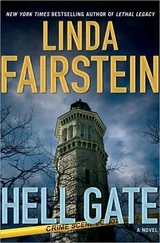"That's just it, Ms. Cooper. I'm afraid I snapped at Thomas, rather than talking with him. You see, he denies knowing anything about an envelope or a problem involving the Blackwells project. Thomas Grenier claims that he never made that telephone call to my wife."
"Shall I wait while you talk to Professor Grenier?"
"I'd prefer to speak with him alone, as we've done with each of you. Perhaps he and I can go down to his office, so I don't inconvenience you any longer. Will you be here at the college during this week?"
"The next two days. In fact, Sylvia and I were discussing the idea of rounding up some of the faculty tomorrow afternoon and having our own meeting about these events."
"I can't tell you how to run your institution, sir, but I hope you don't intend to conduct a private roundtable discussion about Lola Dakota's murder. If that's your plan, the detective and I would like to be present."
Recantati seemed hesitant to challenge any of Sylvia Foote's suggestions. "I, uh, I'll have to check with Sylvia. We were thinking more of housekeeping matters. Making sure that everyone knows we want them to assist you in any way they can." He bowed his head. "I'm so ashamed of the fact that I might have done something to make your job harder. I probably ought to tell them all what I did."
"Please don't, Professor. For the moment, I take it only Grenier is aware of this. Am I right, or have you told anyone else?" "He's the only one."
Grenier and the person who had actually made the telephone call, if there was such a person. "Let's leave it that way. I'd appreciate it if you let me know if you do decide to get a group of the faculty together.
"One other thing. What have you done with the books that were in Professor Dakota's office? Where are they now?"
"Her sister sent someone to pick up most of her personal effects-her papers and photographs, the knickknacks on her desk and the frames on her wall. But she didn't seem interested in Lola's books. Most of those have been packed away in boxes until we get word from the police that they're not needed for the investigation. Those things related to the Blackwells project will be distributed to other members of the faculty who are part of the team, and some of her research volumes will go to the library, of course." "May I look through those cartons while I'm here?" "Is that-? Well…" "Is it legal? Yes, it's fine. I'll make a formal record of anything
I take."
"I'll explain to Grenier where we've stored them, and he can take you there when you and he are finished. It's just down the hall from his room."
Recantati stepped out to the anteroom to give Grenier a few words of instruction, and then I followed the biologist to his office one flight above.
In contrast to the stark decor of Recantati's temporary space, this was garnished with awards and diplomas, a series of lithographs of Edward Jenner vaccinating his experimental population of village folk in England, and a collection of cobalt-blue antique apothecary jars. They were lined up in alphabetical order, with the one labeled "Arsenic" closest to my chair. A large model of the double helix, with its ladderlike strands of DNA in bright primary colors, sat before me on the desk. Grenier expanded and closed it like an accordion while I described my position and the nature of our investigation. I had used the same exhibit in many of my training lectures on the subject of genetic fingerprinting.
"Whatever Lola wants, eh? Lola gets." The biology professor smiled as he spoke the words of the song.
"I don't think she wanted dead, Professor."
"No," he said slowly, stretching out the single syllable. "But how she would have delighted in being the cause of all this intrigue. I think what she would have liked best is the air of suspicion that's been created here and the pointing of fingers at those of us who crossed her. If every one of us whom she disliked could be suspects for even a nanosecond, I think Lola would have left us behind without a second thought."
"Your concern for her is touching."
"Anything else would be pure charade, as you've probably heard. I once made the mistake of singing that song from Damn Yankees to her, the one about whatever Lola wants. I was jabbing at her, mocking her way of wheedling whatever she wanted out of the administration. Unfortunately she countered with the end of the refrain-'and little man, little Lola wants yow.'" He pushed his glasses back against the bridge of his nose and squinted at me. "I hated being called a little man. She knew that. And she delighted in teasing me about not being able to get me. I'm gay, you see. Open, unashamed, perfectly content to take her humor. It was the 'little' business that used to drive me crazy.
"But she had a mean streak a mile long. And when she thought I had tried to deceive Dr. Lavery, she came after me like a man-eating shark."
"Would you tell me what that was all about?" The helix twisted and turned in his hands. "I'm dead tired, Ms. Cooper. The flight in was extremely turbulent and I was awake the entire night. May we do this another time?"
"It would be helpful if I could get started now. The discussion you were just having with Professor Recantati, about the telephone call that was made to his home last week-?"
"I didn't make the damn call. I don't know anything about it. And quite frankly, the idea of that man going through the desk drawers of any one of us is frightening. Sylvia Foote probably cracked her big whip and Paolo jumped through the hoop for her. Just like her to want to know everything that each one of us is up to, and to use the acting president to do her bidding."
"How would you describe your relationship with Lola Dakota?" The yawn he feigned to gain a few seconds to think about his answer was in direct contrast to the lively fidgeting of his bony hands. "Sorry, I'm so tired I can hardly think. Lola?
"We had gotten along just fine, most of the time. I assume that you've done your homework and know about the matter we were working on together?"
"On Roosevelt Island, the Blackwells project? Yes, I've learned a bit about it."
"We both shared a love for a particular building." "The Smallpox Hospital?"
"Yes. Quite the most magnificent structure in New York City, in my view. And for me, of course, this program offered a rather dramatic study of the history of disease, as well as links to the future, like the potential of using these eradicated viruses for germ warfare. I'll have my hands full for years to come." "And Lola's interest?" "It started, appropriately enough, with her discipline-political science and the history of urban institutions. But the old island romanced her, Ms. Cooper."
"Interesting choice of words."
"Well, that ruin is a stunningly romantic building, don't you think?"
"I do, actually. But what do you mean about Lola?"
"For me, it's intellectually valuable to understand how all the infected populations of a large city were isolated in a single location. Typhus, cholera, ship fever. And then this glorious hospital, designed by one of America's greatest architects as though to disguise the fact that it was dedicated to the deadly smallpox.
"The city still has records of who these patients were, how they were treated, and how many-I should say how few-were cured and returned to their homes. I'm interested in documenting that information and using my students to put it together for the first time."
"What about Lola?"
"A lot of our interests overlapped-same records, same patients. For her studies of the culture, it was intriguing that the charity patients-mostly impoverished immigrants-were kept in a ward on the lower floors. The rich who were infected were banished to the same facility, but to private rooms on the upper floor. For my work, that's of no importance. But Lola liked that kind of cultural detail. She constructed entire fantasies about the people who passed through there."
Читать дальше












